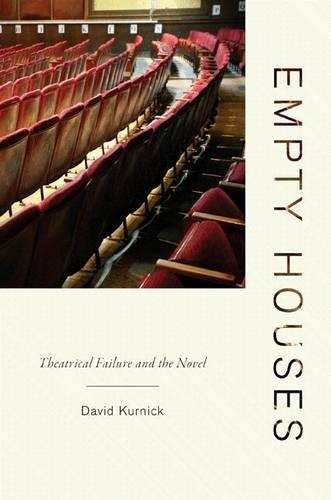
Empty Houses: Theatrical Failure and the Novel
(Paperback)
Publishing Details
Empty Houses: Theatrical Failure and the Novel
By (Author) David Kurnick
Princeton University Press
Princeton University Press
6th March 2012
United States
Classifications
Tertiary Education
Non Fiction
Literary studies: c 1800 to c 1900
Literary studies: c 1900 to c 2000
823.009
Commended for MSA Book Prize 2013
Physical Properties
Paperback
272
Width 152mm, Height 235mm
369g
Description
According to the dominant tradition of literary criticism, the novel is the form par excellence of the private individual. "Empty Houses" challenges this consensus by reexamining the genre's development from the mid-nineteenth to the mid-twentieth century and exploring what has until now seemed an anomaly - the frustrated theatrical ambitions of major novelists. Offering new interpretations of the careers of William Makepeace Thackeray, George Eliot, Henry James, James Joyce, and James Baldwin - writers known for mapping ever-narrower interior geographies - this book argues that the genre's inward-looking tendency has been misunderstood. Delving into the critical role of the theater in the origins of the novel of interiority, David Kurnick reinterprets the novel as a record of dissatisfaction with inwardness and an injunction to rethink human identity in radically collective and social terms. Exploring neglected texts in order to reread canonical ones, Kurnick shows that the theatrical ambitions of major novelists had crucial formal and ideological effects on their masterworks. Investigating a key stretch of each of these novelistic careers, he establishes the theatrical genealogy of some of the signal techniques of narrative interiority. In the process he illustrates how the novel is marked by a hunger for palpable collectivity, and argues that the genre's discontents have been a shaping force in its evolution. A groundbreaking rereading of the novel, "Empty Houses" provides new ways to consider the novelistic imagination.
Reviews
Shortlisted for the 2013 MSA Book Prize, Modernist Studies Association "Empty Houses is an admirable book. Its willingness to question established views on the novel has enlightening results. In the boldness and originality of its arguments, it makes a valuable contribution not only to scholarship on the novelists it considers, but also more widely to our understanding of the novel as a genre."--Matthew Peters, Times Literary Supplement "Kurnick's thoughtful, subtle, well-argued book focuses on five writers closely associated with the movement toward, and the apotheosis of, interiority in the novel: Thackeray, George Eliot, Henry James, James Joyce, and James Baldwin. All had theatrical ambitions that were largely unsuccessful. Kurnick makes the case that the novel's shift from public spaces to psychological interior spaces is fraught with ambivalence, with 'longing references to the public worlds they would seem to have left behind.'"--Choice "Empty Houses: Theatrical Failure and the Novel advances a sophisticated, highly nuanced argument about the relationship of drama, performance, and fiction... Kurnick's argument ... is formidable and skillfully executed... [V]ery often brilliant and incisive."--Stephen Watt, James Joyce Literary Supplement
Author Bio
David Kurnick is assistant professor of English at Rutgers University.
